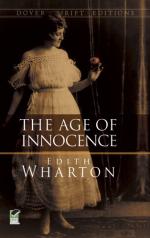Suddenly, before an effulgent Titian, he found himself saying: “But I’m only fifty-seven—” and then he turned away. For such summer dreams it was too late; but surely not for a quiet harvest of friendship, of comradeship, in the blessed hush of her nearness.
He went back to the hotel, where he and Dallas were to meet; and together they walked again across the Place de la Concorde and over the bridge that leads to the Chamber of Deputies.
Dallas, unconscious of what was going on in his father’s mind, was talking excitedly and abundantly of Versailles. He had had but one previous glimpse of it, during a holiday trip in which he had tried to pack all the sights he had been deprived of when he had had to go with the family to Switzerland; and tumultuous enthusiasm and cock-sure criticism tripped each other up on his lips.
As Archer listened, his sense of inadequacy and inexpressiveness increased. The boy was not insensitive, he knew; but he had the facility and self-confidence that came of looking at fate not as a master but as an equal. “That’s it: they feel equal to things—they know their way about,” he mused, thinking of his son as the spokesman of the new generation which had swept away all the old landmarks, and with them the sign-posts and the danger-signal.
Suddenly Dallas stopped short, grasping his father’s arm. “Oh, by Jove,” he exclaimed.
They had come out into the great tree-planted space before the Invalides. The dome of Mansart floated ethereally above the budding trees and the long grey front of the building: drawing up into itself all the rays of afternoon light, it hung there like the visible symbol of the race’s glory.
Archer knew that Madame Olenska lived in a square near one of the avenues radiating from the Invalides; and he had pictured the quarter as quiet and almost obscure, forgetting the central splendour that lit it up. Now, by some queer process of association, that golden light became for him the pervading illumination in which she lived. For nearly thirty years, her life—of which he knew so strangely little—had been spent in this rich atmosphere that he already felt to be too dense and yet too stimulating for his lungs. He thought of the theatres she must have been to, the pictures she must have looked at, the sober and splendid old houses she must have frequented, the people she must have talked with, the incessant stir of ideas, curiosities, images and associations thrown out by an intensely social race in a setting of immemorial manners; and suddenly he remembered the young Frenchman who had once said to him: “Ah, good conversation—there is nothing like it, is there?”
Archer had not seen M. Riviere, or heard of him, for nearly thirty years; and that fact gave the measure of his ignorance of Madame Olenska’s existence. More than half a lifetime divided them, and she had spent the long interval among people he did not know, in a society he but faintly guessed at, in conditions he would never wholly understand. During that time he had been living with his youthful memory of her; but she had doubtless had other and more tangible companionship. Perhaps she too had kept her memory of him as something apart; but if she had, it must have been like a relic in a small dim chapel, where there was not time to pray every day. . . .




